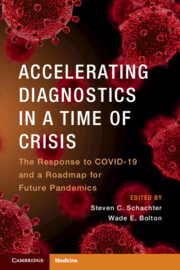 Accelerating Diagnostics in a Time of Crisis
Accelerating Diagnostics in a Time of Crisis Published online by Cambridge University Press: 06 January 2024
This chapter describes lab verification and clinical validation of tests for the detection of SARS-CoV-2. As new SARS-CoV-2 tests were being developed early in the pandemic, extensive lab verification studies to “test the tests” were conducted at ACME POCT at Emory University. Initial testing was performed in a Biosafety Level 3 facility to determine if the assays could detect propagated SARS-CoV-2 in ideal conditions and evaluate the specificity of these tests. We then describe the establishment of a Biorepository to bank SARS-CoV-2 variant samples and use these samples to determine whether tests could detect new variants with equal sensitivity as the original wild-type virus. This chapter also describes the clinical validation of tests using samples collected from individuals at testing centers. The clinical validation core requires careful planning for staffing and personnel training, semi-permanent and mobile clinical sites, defining inclusion and exclusion parameters, and data collection and reporting. Our experience demonstrated the importance of developing strong relationships with academic and private partners to facilitate clinical site setup, marketing, and purchasing.
To save this book to your Kindle, first ensure [email protected] is added to your Approved Personal Document E-mail List under your Personal Document Settings on the Manage Your Content and Devices page of your Amazon account. Then enter the ‘name’ part of your Kindle email address below. Find out more about saving to your Kindle.
Note you can select to save to either the @free.kindle.com or @kindle.com variations. ‘@free.kindle.com’ emails are free but can only be saved to your device when it is connected to wi-fi. ‘@kindle.com’ emails can be delivered even when you are not connected to wi-fi, but note that service fees apply.
Find out more about the Kindle Personal Document Service.
To save content items to your account, please confirm that you agree to abide by our usage policies. If this is the first time you use this feature, you will be asked to authorise Cambridge Core to connect with your account. Find out more about saving content to Dropbox.
To save content items to your account, please confirm that you agree to abide by our usage policies. If this is the first time you use this feature, you will be asked to authorise Cambridge Core to connect with your account. Find out more about saving content to Google Drive.